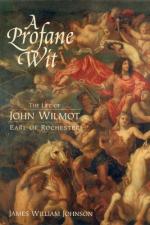|
This section contains 6,135 words (approx. 21 pages at 300 words per page) |

|
SOURCE: Wilcoxon, Reba. “Pornography, Obscenity, and Rochester's ‘The Imperfect Enjoyment.’” Studies in English Literature 15, No. 3 (Summer, 1975): 375-90.
In the following essay, Wilcoxon claims that Rochester's poem “The Imperfect Enjoyment” is not pornographic because it satisfies three aesthetic criteria: it uses complex linguistic devices to achieve psychic distancing; it is linked to a classical traditional of “imperfect enjoyment” poems; and it explores not only sexual but emotional, psychological, and ethical relationships between human beings.
In the right-hand drawer of his writing desk, where he normally kept his flutes and music books, Samuel Pepys concealed a book that he thought “unfit to mix with my other books.”1 It was Poems on Several Occasions By the Right Honourable, E. of R———, the abbreviation known to all as the notorious John Wilmot, Earl of Rochester. Writing to his clerk in November, 1680, four months after Rochester's death, Pepys advised, “pray let it remain...
|
This section contains 6,135 words (approx. 21 pages at 300 words per page) |

|


